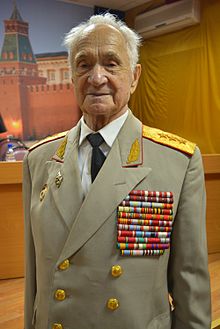Anatoly Grigoryevich Mereschko
Anatoli Grigoryevich Mereschko ( Russian Анатолий Григорьевич Мережко ; born August 7, 1921 in Novocherkassk , Rostov Oblast ; † December 11, 2018 in Moscow ) was a senior Soviet military officer during the Cold War . From 1969 to 1983 he was Chief of Operational Administration and Deputy Chief of Staff of the United Armed Forces of the Warsaw Pact States with the rank of Colonel General .
Life
Mereschko is the son of Grigory Danilowitsch Mereschko (1895-1979) and his wife Irina G. After school he was drafted into the Red Army in October 1939 and completed his training in the 25th Infantry Regiment of the 104th Infantry Division in Chapayevsk . In February 1940 he began studying at the Military Infantry School in Ordzhonikidze and at the newly established 2nd Ordzhonikidze Infantry School (Орджоникидзевское военно-пехотное училище (ОВПУ) on June 22nd, 1941, when the Soviet Union attacked the Soviet Union on June 22nd, 1941, and ended the attack on the Soviet Union on June 22nd, 1941 his early discharge as a lieutenant and he became commander of the 2nd platoon of the Kursanten within the 7th reserve army, from which the 62nd Army was formed in July 1942 . The Kursanten were converted into a regiment of the 62nd Army. In his first war mission, Mereschko fought against the German troops at the train station in Surowikino , west of Stalingrad . In September 1942 the remnants of the Kursanten regiment with around 120 men were withdrawn to the left bank of the Volga. Shortly thereafter, Mereschko was assigned the rank of first lieutenant as a liaison officer with the staff of the 62nd Army. In October 1942, on the recommendation of his battalion commander, he was assigned as an intelligence officer in the operational department of the staff of the 62nd Army. In July 1943 he was part of the operational department of the 29th Guards Rifle Corps ( Southwest Front ). During the Second World War he fought on other fronts via Zaporizhia , Odessa , Zhukovsky , Lodz , Poznań to Berlin .
After the end of the war he studied at the Frunze Military Academy in Moscow from July 1945 and was assigned to the operational management of the Leningrad military district in 1946. From 1951 he is with the 30th Guards Rifle Corps. From September 1955 to October 1957 he studied at the Military Academy of the General Staff of the Armed Forces of the USSR "KJ Voroshilov" in Moscow.
From November 1957 he became head of the department of operational preparation of the staff (personnel training) of the Group of the Soviet Armed Forces in Germany (GSSD) and in August 1958 head of the personnel department of the operational administration of the staff of the GSSD. From December 1960 he became deputy head of the operational department of the GSSD staff and was responsible for planning the security of the border control barrier between East Berlin and West Berlin under the Commander-in-Chief of the GSSD, Army General Iwan I. Jakubowski . In this role he was also actively involved in closing the sector border in Berlin .
In August 1962 he became head of the operational administration of the Southern Group of Soviet Forces (SGT) in Hungary . From October 1964 he commanded the 77th Guards Rifle Division and then the 54th Infantry Division of the Leningrad Military District . From December 1966 he was head of the department for tactical and operational training of engineers at the Kuibyshev military academy for engineer troops and received a professorship here.
From June 1969 until his retirement in December 1983, he was Chief of Operations and Deputy Chief of Staff of the United Armed Forces of the Warsaw Pact States, with the rank of Colonel-General, and attended several meetings of the Political Advisory Committee (PBA).
From 1984 to 1991 he worked in the scientific and methodological center of civil defense of the Soviet Union.
An interview with the historian Manfred Wilke caused quite a stir . In this conversation, which was published in the Germany Archive 02/2011 on February 4, 2011, Mereschko claims that he planned the construction of the Berlin Wall and not Erich Honecker as he claims to be. The Superillu published a four-page report on this. Maria Nooke , deputy director of the Berlin Wall Foundation , told the Berliner Kurier that the thesis would be dealt with at the scientific conference on the 50th anniversary of the building of the wall.
Awards
- Order "For Service to the Fatherland in the Armed Forces of the USSR" (III. Class)
- Order of Friendship between Nations
- Order of the October Revolution
- Order of the Great Patriotic War
- Alexander Nevsky Order
- Order of the Red Banner (3 ×)
- Order of the Red Star (4 ×)
Web links
Individual evidence
- ↑ Ушёл из жизни в бессмертие легендарный сталинградец ... Подвиги его бессмертны! accessed on March 28, 2019
- ↑ "Do you work out a plan to limit order between both parts of Berlin!" . In: Germany Archive , 02/2011, February 4, 2011.
- ↑ "Not Honecker, I planned the wall" . In: Superillu , issue 12/2011, March 17, 2011, pp. 16-19.
- ↑ "I planned the wall" . In: Berliner Kurier , March 17, 2011.
| personal data | |
|---|---|
| SURNAME | Mereschko, Anatoly Grigoryevich |
| ALTERNATIVE NAMES | Мережко, Анатолий Григорьевич (Russian) |
| BRIEF DESCRIPTION | Soviet officer, deputy chief of staff of the Warsaw Pact (1969–1983) |
| DATE OF BIRTH | August 7, 1921 |
| PLACE OF BIRTH | Novocherkassk |
| DATE OF DEATH | December 11, 2018 |
| Place of death | Moscow |
